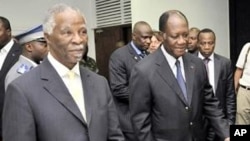West African leaders are scheduled to meet Tuesday to discuss the political crisis in Ivory Coast, where rival presidents have competing governments following a controversial election.
Leaders from the Economic Community of West African States, of ECOWAS, will meet in Abuja to discuss how the alliance might help resolve the crisis in Ivory Coast.
ECOWAS Chairman and Nigerian President Goodluck Jonathan says West African heads of state will work with the international community to preserve good governance in the region.
Ivory Coast now has two governments and two presidents after Laurent Gbagbo and Alassane Ouattara took dueling oaths of office based on competing election results.
Mr. Ouattara says he is the president because the electoral commission announced results showing him with more 54 percent of the vote. Mr. Gbagbo says he is the president because the country's constitutional council annulled nearly 10 percent of all of the ballots cast to give him 51 percent of the vote.
Mr. Gbagbo is backed by senior military officers who control southern regions of the country. Mr. Ouattara is backed by former rebels who still control most northern regions.
Former South African President Thabo Mbeki left Abidjan late Monday after two days of mediation between Mr. Gbagbo and Mr. Ouattara. There was no clear breakthrough for the African Union mission, but the diplomats say they will continue to work with ECOWAS and the United Nations to ensure that Ivory Coast's transition to democracy succeeds.
All three groups have called on Mr. Gbagbo to step aside for Mr. Ouattara.
Martin Nesirky is the spokesman for U.N. Secretary General Ban Ki-moon.
"The Secretary General remains deeply concerned about the situation in Côte d'Ivoire," said Nesirky. "He has been in close contact with many world leaders, including President Blaise Compaore of Burkina Faso, President Goodluck Jonathan of Nigeria, current Chair of the Economic Community of West African States, and President Bingu wa Mutharika of Malawi, Chair of the African Union, as well as Jean Ping, Chair of the Commission of the African Union."
Because of the deteriorating security situation, Nesirky says the U.N. mission in Ivory Coast is temporarily relocating 460 non-essential staff members to Gambia.
Soldiers continue to man roadblocks in Abidjan, where Ouattara supporters burned tires on Monday to protest the political standoff. The country's borders are reopened, but Mr. Gbagbo's government is extending an overnight curfew for another week.
West African Leaders to Meet on Ivory Coast Political Crisis




